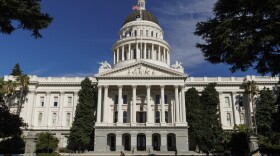Just as the Tea Party drew heavily on a public backlash against government spending, another new political movement — the Tequila Party — aims to use the latest crackdown on illegal immigration to motivate Latinos to vote in 2012.
Arizona Republican DeeDee Garcia Blase formed the National Tequila Party Movement as an answer to a Tea Party influence she blames for increased political opposition to immigration.
The group has no aspirations to become a third political party. Its focus will be registering as many of the nation's 21 million voting-age Latinos as it can, targeting young voters in presidential battleground states.
Unlike the Tea Party groups, which have generally aligned with Republicans, the Tequila Party pledges no allegiance to either major party. Blase has dropped her affiliation as a lifelong Republican — and plans to resign as president of Somos Republicans — to protest the Republican-led immigration enforcement law passed in her home state of Arizona. The Tequila Party held its launch party in Tucson last month.
"It's been very, very frustrating. I'm embarrassed for the state of Arizona and the Republican Party there," Blase says. "I'm a Republican, but I'm a reasonable Republican."
Arizona's immigration policy has resurfaced this week as Phoenix prepares to host Major League Baseball's All-Star game Tuesday. Latinos, particularly those from other countries, make up roughly a third of big leaguers and nearly half of minor league rosters. The players' union has publicly opposed Arizona's law, but the league itself has remained silent.
The law, which is being challenged by the Obama administration in federal court, would tighten the surveillance, prosecution and deportation of suspected illegal immigrants. Stricter versions recently were passed in Alabama and Georgia, and both also are being challenged in federal court.
The Tea Party Isn't The Only Target
Most of Blase's ire is reserved for Tea Party groups, which she believes have pushed state and congressional Republicans to adopt tougher positions against illegal immigration.
"We have no choice but to empower ourselves and work on a massive national movement to counter the message of the Tea Party. We believe the Tea Party is an anti-immigration movement," Blase says.
Leaders of the largest national Tea Party groups have insisted their official platform is focused on cutting the federal budget and shrinking government.
Mark Meckler, co-founder of the Tea Party Patriots, one of the largest national groups of its kind, said immigration "isn't an issue for us." He acknowledged that the organization's roughly 3,500 chapters take up a wider range of issues affecting their communities. He said he didn't know of any local affiliates that advocate on immigration policy.
"At the national level, the only position we've taken on immigration is that the borders should be secured," Meckler says. "Once we secure the borders, we can have more legitimate discussions about those other issues."
However, smaller Tea Party groups in Arizona, North Carolina and other states have publicly placed immigration enforcement high on their advocacy lists. And many Tea Party-backed Republicans in Congress are leading the crackdown on illegal immigration, such as Rep. Steve King (R-IA), who has introduced a bill to eliminate automatic citizenship for children born in the U.S. to illegal immigrants.
Many Hispanics have also grown frustrated at Democrats for failing to help push immigration reform bills through Congress. And that failure to pass federal legislation has hurt President Obama's standing among Latinos who looked to him to deliver on his campaign pledge to sign an immigration reform law in his first year in office.
In a national survey released in June, 41 percent of Latinos said Obama isn't serious about getting immigration reform passed and that he instead is only "saying what Hispanics want to hear." Half of those polled also faulted congressional Republicans for the failure of reform legislation, while a third of them said Obama hasn't pushed strongly enough for passage. The poll, conducted by Latino Decisions, a California-based firm that tracks opinions of Hispanic voters, also found that immigration was the most important issue for Latino voters, topping jobs and the economy by some 15 points.
Last week, a Gallup poll found that Hispanics' support for Obama had declined by nearly a third since 2009, to 52 percent in June. Since President George W. Bush took about 40 percent of the Latino vote in 2004, the Republican Party's hardening line on immigration has led an increasing majority of Hispanics to vote for Democratic candidates. In 2008, Obama took two-thirds of the Hispanic vote, according to the Pew Hispanic Center.
On Tuesday, issues affecting immigrants will be among those addressed in a Hispanic policy forum hosted by the White House.
Voter Registration Doesn't Necessarily Equal Voting
The Tequila Party faces a big challenge. Although the Latino voting-age population has nearly doubled in the past decade and now stands at 21 million, voter turnout remains anemic.
Only 31 percent voted in the 2010 midterm elections — compared with 50 percent of whites and 44 percent of African-Americans — according to the Pew Hispanic Center.
The Tequila Party will focus on registering Latinos, particularly in states with rapidly growing Hispanic populations. That will include activism in states with policies that the group believes unfairly target Latinos.
These groups trying to organize like the Tea Party show how terribly they misunderstand the Tea Party movement. Nobody chose the name and decided, 'Oh, gosh, we need to start a movement.' It was organic. You can't force these things. They are trying to force something to look like or have a movement like the Tea Party. It's simply not possible.
First up on a 20-state campaign, on July 29, will be Kansas, where an Arizona-style immigration bill failed to pass the state Legislature this year. But next year, the state will enact a so-called voter ID law, requiring people to present identification at the polls that proves U.S. citizenship.
Pursuing a bipartisan approach, Blase has recruited veteran Latino Democratic operatives Fernando Romero of Nevada and Gus Garcia of Miami. Romero, who supported Republican John McCain for president in 2008, is credited with devising the group's name. And Garcia, who was the national Latino co-chair for Hillary Clinton's 2008 presidential campaign, will act as the group's primary political adviser.
One problem Latino groups have traditionally faced in mobilizing Hispanics as a voting bloc is the wide array of differing Hispanic ideologies. For instance, Cuban-Americans in south Florida tended to vote Republican because of that party's conservatism and their historic distrust of the Democratic Party following the failed Bay of Pigs invasion under President Kennedy. Yet Mexican-Americans in California have leaned Democratic because of that party's strength in heavily Hispanic urban areas, advocacy of social programs and support for pro-amnesty immigration reforms.
The Tequila Party hopes the latest immigration struggles will prove to be a unifying force. Its strategy is to target young voters in 10 presidential battleground states, including Florida, Illinois and California.
"We're the only society in America that gets their political information from the young, because they get the news first," Garcia says. "They are our translators. And they are getting to the point where they are saying 'Where's the beef?' on this issue."
Historians say U.S. political movements formed along racial or ethnic lines traditionally have met with mixed results for a variety of reasons, starting with the limits of organizing to change one policy.
"Single-issue movements are just that. What else do you have to offer?" says W. Jelani Cobb, an American history professor at Rutgers University and author of the 2010 book The Substance of Hope: Barack Obama and the Paradox of Progress. "To create national infrastructure or state infrastructure is almost impossible these days because it's difficult to get up enough numbers to influence the Electoral College."
Cobb says voter registration drives are standard fare for many political, civic and advocacy groups, such as the NAACP and the National Council of La Raza, which, respectively, are the oldest African-American and Hispanic civil rights groups. "Those," he says, "are not all the ingredients for a movement. There's no emotional appeal. Maybe the best thing that can happen for them is some high-profile anti-immigrant xenophobe begins attacking them."
Cobb says that such extreme opposition has surfaced, but he's "skeptical" that it will galvanize Hispanics "because of the entrenched stability of the two-party system, the difficulty of instituting reform and the short life span of these organizations even when they have charismatic leaders and timely issues."
Meckler, the co-founder of the Tea Party Patriots, also contends that efforts to duplicate the Tea Party may fall flat. "These groups trying to organize like the Tea Party show how terribly they misunderstand the Tea Party movement. Nobody chose the name and decided, 'Oh, gosh, we need to start a movement.' It was organic. You can't force these things. They are trying to force something to look like or have a movement like the Tea Party. It's simply not possible."
Copyright 2022 NPR. To see more, visit https://www.npr.org. 9(MDAzMjM2NDYzMDEyMzc1Njk5NjAxNzY3OQ001))






